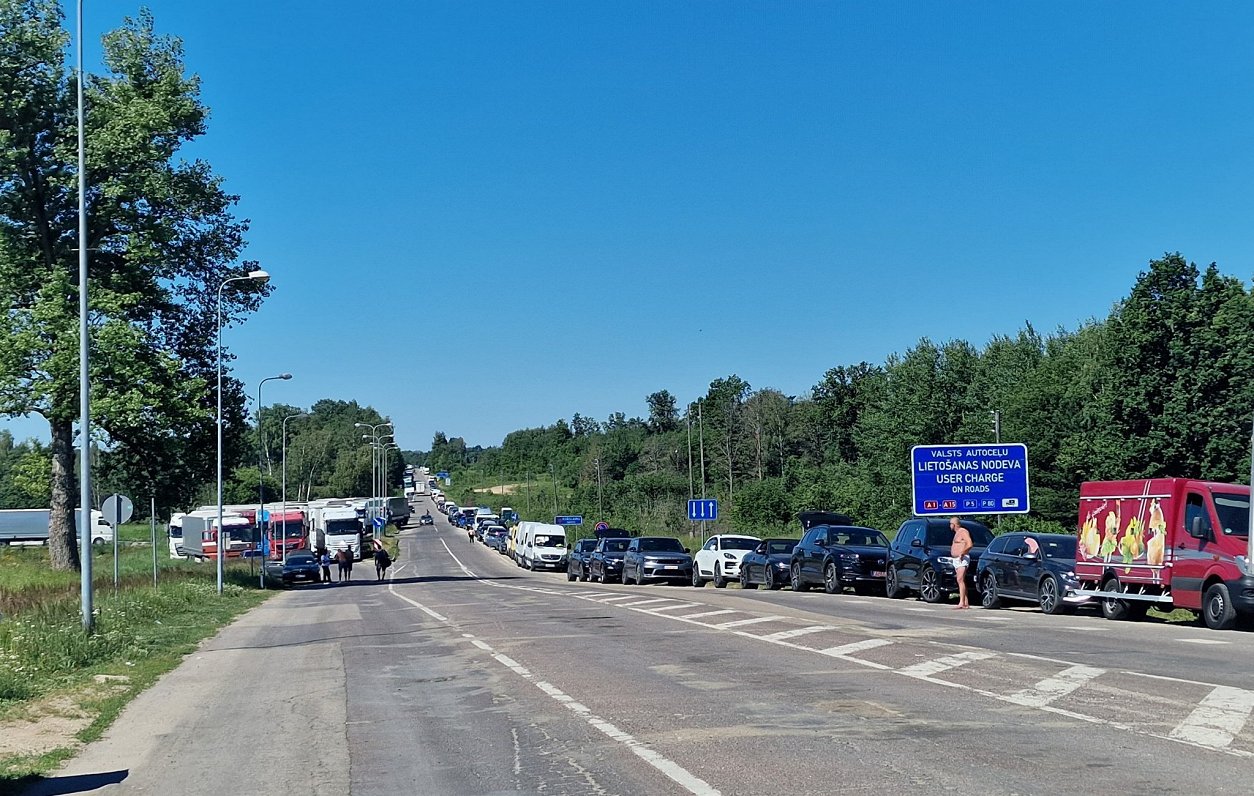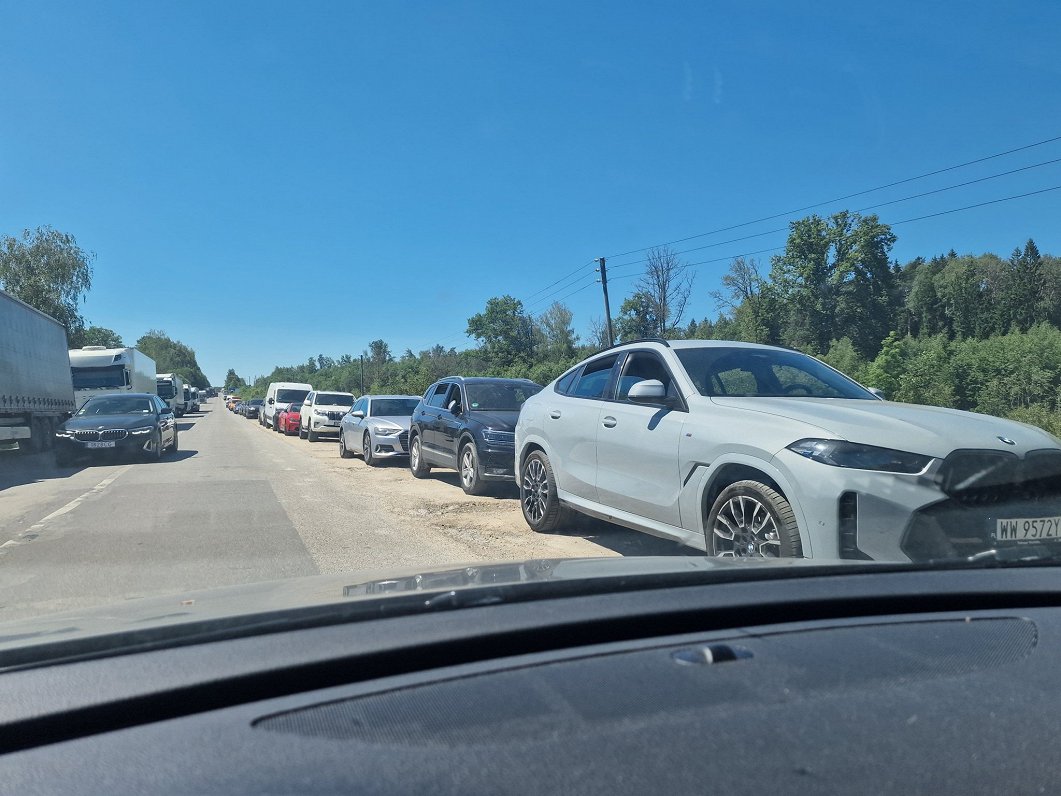Europe banned the export of luxury cars to Russia two years ago, but did not impose the same sanctions on Belarus. Since then, Belarus has become an obvious car transit corridor to Russia, with car exports to Belarus via Latvia increasing 50 times over. It would take astonishing naiveté to believe the vast majority of these high-spec vehicles are not being immediately driven onward to Russia for delivery.
Latvia's customs service would like the sanctions imposed against Moscow to be duplicated against Minsk, but for now the EU does not plan to take any action. The result is a glaring illustration of the ease of sanctions evasion in broad daylight.
At the beginning of the week, the European Union approved the 14th package of sanctions against Russia, and the Latvian Ministry of Foreign Affairs has been busily publicising the fact. The representatives of EU member states in Brussels reached an agreement in principle on wider sanctions against Belarus, aligning them more closely with those on Russia, butthey have yet to be agreed in law.
Russia and Belarus are in a common customs union, therefore there is a huge opportunity for goods subject to Russian sanctions but not Belarusian sanctions to simply take a scenic detour. Sanctions against Belarus are scheduled to be approved next week, and they will apply to manganese ore – which has continued to head east, as previously reported by LSM – and to several dual-use goods that can also be used for military purposes. However, luxury cars are not classed as dual-use goods, even if they are being driven by the very oligarchs who underwrite Putin's war machine.
So the export of exclusive cars from the European Union to Belarus will continue, at least for the time being, so wealthy Russians can continue to get their hands on desirable new vehicles from Porsche, Mercedes, BMW, Lexus and other luxury marques instead of having to drive domestic Ladas or the Chinese imports that are flooding the Russian market.
400 cars and week-long waits
Pāternieki in Krāslava county is currently the only open border crossing point between Latvia and Belarus.
On one side of the road there is a line of trucks several kilometers long, while on the other side – exclusive cars from Germany, Lithuania, Poland and other countries with so-called transit or temporary numbers that show the used motor trade is taking full advantage of this sanctions loophole.

Prominent in the line are large 4x4s, electric cars and sports cars worth at least 50,000 euros – not the sort of vehicles often seen at this out-of-the-way location in one of Latvia's poorest regions. Unsurprisingly, drivers deny there is anything nefarious going on.
"No, no, everything is to order for private citizens. For private citizens of Belarus," claims one driver. "I am a citizen of Belarus, this is my car," said another.
The drivers Latvian Radio spoke to all claimed that the exclusive cars are their own or that they are just taking them to someone they personally know in Belarus.
Customs officials are not convinced but as things stand but are limited in what they can do. Checks are time-consuming.
"In this case, our job is to be skeptical, check and try to enforce the sanctions not formally, but in essence," said Taivo Hanzens, deputy chief supervisor of the Pāternieku customs checkpoint.
"Cargo from Belarus can easily reach Russia, especially as we know that the countries are in a customs union, where in fact the movement of cargo is free. If this happens, it means that the sanctions are not respected in essence. Therefore, we cannot simply trust what is written in the document," explained Hanzens.
Latvian customs officials evaluate not only documents, but also the history of previous transactions, as well as look for evidence and discrepancies that could indicate the true destination of the transit car.
"We also find cases where a previous shipment was declared to Belarus, but is found in Russia in the publicly available register, then this is already a case where we can assess not simply the return of the cargo, but possible criminal liability," said Hanzens.
However, that puts Latvian customs in the odd position of sometimes relying upon Russia's own official declarations and data. Given Russia's track record when it comes to veracity and its reputation for bribery of officials, that does not inspire much confidence.
Such checks take a lot of time, which is why long queues form. Similar to truck drivers, exclusive car drivers can spend about a week waiting in line at the border.
At the moment, 400 such cars are waiting in line, as well as another 340 trucks. That's why customs officials are urging the unification of sanctions against both Russia and Belarus.
"If these sanctions were the same, this type of fraud would disappear and the work we expend to prevent it would also disappear," Hanzens said.
Latvian Foreign Minister Baiba Braže is in favor of aligning the sanctions against Russia and Belarus. "There was a discussion [in Brussels] about these specific groups of goods, we believed that they should be banned. These were the things that there was a lot of discussion about, where some countries had a different opinion than ours. In any case, from our point of view – even if it is not now put in, then we will put it forward again at the next chance and we will see. When there are statistics and data, it helps a lot to argue for this," said Braže.
The statistics are persuasive. According to the information of the State Revenue Service, only 60 cars were exported to Belarus via Latvia four years ago. Last year there were more than 3,000. Either the Belarus economy is enjoying a sensational boom or some of those drivers who consider it worthwhile to wait in line for a week at the border for the sake of a full leather interior may not be quite the high-fliers they claim.


























